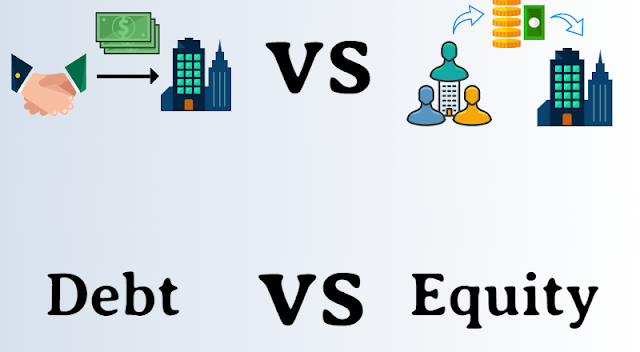Debt Vs. Equity
Debt Vs. Equity
 |
Debt Vs. EquityDebt Vs. Equity |
As a difficult money lender, I get calls day by day from actual estate traders wanting help funding their next undertaking. Numerous of them are so centered on one way to do it, they some of the time miss openings to create cash. It was many months back I talked with a speculator that needed us to finance a bargain in Denver. It was a fix and flip and the deal had merit. It would have likely produced a sizable profit. Unfortunately, we may never know. He lost the deal for lack of funding. What happened? He did not understand the different ways to fund real estate deals and was not willing to listen to advice. The fact is that sometimes an investor needs to get creative which could lead to less profit. But, in this case, a piece of something would have been a lot better than all of nothing
 |
| Debt Vs. Equity |
Debt
Debt: Debt is the simplest to understand and the least creative. Debt is just a loan. There are multiple types of loans; bank loans, conventional loans, government loans, private money loans, hard money loans, and several others. Debt generally takes no ownership stake for your deal and also you gained’t want to give up manipulate. In real estate, loans are typically secured by the project, but sometimes you can use other properties or assets as additional collateral. That is referred to as cross-collateralization or blanket financing and is about as creative as it comes with debt. Lenders typically want a set rate of return, so when you borrow the money you will likely pay fees and a set interest rate. You will also probably have a set amount of time to return the money. Debt is the cheaper of the two options, but is riskier for two reasons
Debt holders get paid back first. If there is a problem with the project, the lender is the last one to ever take a loss. It is common in a loss situation that the owners take the loss and the lenders get paid back in full, including all interest and fees. This is why many savvy investors choose to lend money or work with companies that do.
Most lenders will also require monthly payments which creates pressure for a project.
Qualifying for debt is typically a bit more challenging than equity. Most banks and conventional lenders base their loan decision on cash flow. That creates a problem with fix and flips because fix and flips have no monthly cash flow. They have no positive cash flow until the project is done and sold. Other qualifying factors are important too, like credit, reserves, and the collateral. To some lenders, like commercial banks, your credibility is also a factor. Creditability is the lender's belief you can handle the project, so they will look at the experience and possibly want to interview you. Except for a fix and flip or new construction, no lender I know will make a loan on a property with negative cash flow unless an individual guarantor has personal cash flow that will support the payments. Cash flow is king, which can sometimes make debt a tricky way to go
Equity
Equity:
Equity is a much safer strategy and it creates a lot more options. Equity participants take a piece of the deal in exchange for use of their money. That is a simple way to look at it, but with equity, you can get very creative. I have seen partnership deals with a straight split, a preferred or promised return with or without a piece of the deal, control or no control, long term deals and short-term deals; and I have seen the variation of all of these. The sky is the limit when it comes to equity funding. Real estate investors don't typically like equity because they can get very expensive. Although it can be costly, here are some of the benefits
Equity is a much safer strategy and it creates a lot more options. Equity participants take a piece of the deal in exchange for use of their money. That is a simple way to look at it, but with equity, you can get very creative. I have seen partnership deals with a straight split, a preferred or promised return with or without a piece of the deal, control or no control, long term deals and short-term deals; and I have seen the variation of all of these. The sky is the limit when it comes to equity funding. Real estate investors don't typically like equity because they can get very expensive. Although it can be costly, here are some of the benefits
More value makes a bargain more grounded and less demanding to fund
May not need to make monthly payments.
There is a ton of flexibility.
Spreads the risk.
To qualify for equity funding, you just need to be able to sell the deal and to sell yourself. There is rarely a credit check, income is not an issue, and cash reserves won't cause you grief (heck this is the most common reason investors go the equity route).
What I see a lot of is a combination of debt and equity. Remember my client that lost a sizable payday because he zeroed in on debt? If he opened his mind to equity, he could have brought in a partner to help meet our requirements and then we would have funded the deal. He probably could have brought in a partner to inject a little capital and sign on the loan for less than 30% of his deal. Yes, it is expensive, but it would have gotten the deal done. He probably would have still made $30,000, but instead, he made nothing.
Debt is cheap, even hard money is cheaper than a partner on good deals. Sometimes I hear a potential client complain that we or other hard money lenders charge too much. They would prefer to bring in a partner to fund the deal. If you do the math, you will likely see that hard money is cheaper than a partner and you don't need a lot of money down to get the deal done. That assumes you are doing profitable deals of course
Equity is safer; however, you will probably pay a little more for it. There are advantages and disadvantages to both, and each deal may require a different strategy to finance it. It is all math, so I would encourage you to look at the numbers and be open to both debt and equity or a combination of both. Everyone at Pine Financial is experts in actual property finance. It is common for us all to put our heads together in our office to help our clients succeed. The next time you are questioning the best way to fund a deal, give us a call and let us be your second set of eyes. We only succeed when our clients do!




No comments